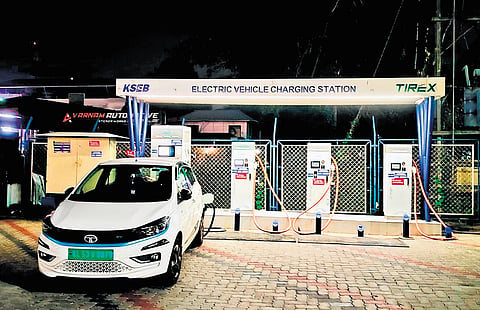

KOCHI: Now, you need to plan even the charging of your electric vehicles! Starting April 1, charging electric vehicles (EVs) from public charging stations during the evening and night hours will cost more. The moves comes after the Kerala Electricity Regulatory Commission (KERC) approved the tariff revision applicable to public EV-charging stations. And the KSEB is set to implement the change widely.
Under the new tariff approved, separate rates will be applicable for solar (9am to 4pm) and non-solar (4pm to 9am) hours, as against the single rate system followed so far. While a consumer will be charged Rs 5 per unit during solar hours, they have to pay a higher rate -- Rs 9.30 per unit -- during non-solar hours. As of now, a single tariff of Rs 5.50 per unit (Rs 100 per KW) is being charged.
“KERC issued the notification regarding the revised tariff on December 5, but it is yet to be enforced widely. To implement the same, KSEB has to reset the time zone of the meters to solar and non-solar hours,” a senior KSEB official told TNIE.
He said the revised rates will be applicable once the newly-programmed meters from the testing lab are installed at public charging stations.
“The first lot of the meters is out and the process will take one or two weeks more,” the official said.
On cue, private players have already hiked the rates.
“We’ve made a corresponding increase at our charging stations. Among the private players, EVOK still provides the lowest rate. We now charge Rs 13.80 per unit during solar hours and Rs 17 per unit during non-solar hours,” said Reji Mohan, president of Electric Vehicles Owners Kerala (EVOK).
While KSEB officials claim the move is to encourage charging of vehicles during productivity hours, criticism has risen from various quarters that the move will adversely affect the changing public transportation sector as well. For a majority of such vehicles are charged at night to facilitate uninterrupted services during the day.
“Most of our e-buses are charged at night. The rise in tariff is huge, from Rs 5.5 per unit to Rs 9.30 per unit. The increased power charges will act as a huge burden. KSEB authorities should exempt at least public transport vehicles,” a KSRTC official said.
The KSRTC Swift operates over 100 e-buses in Thiruvananthapuram city, with plans afoot to set up public EV charging stations at various bus depots to cash in on the demand.
The e-auto drivers will be one community that will be affected the most.
“The move will result in added expenses to the drivers as most of them charge their vehicles during non-solar hours. KSEB should withdraw the tariff revision,” said M B Syamantha Bhadran of the Ernakulam Jilla Auto Drivers Cooperative Society.
The KSEB has already implemented the revised rate in charging stations of institutions like the Kochi Water Metro Ltd. “We’re already been charged under the new tariff. The net effect with regard to expense is more or less the same as they have taken away the fixed charges,” a senior Water Metro official said.